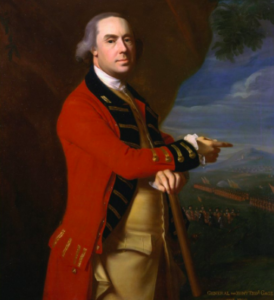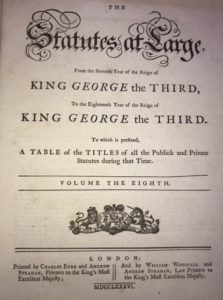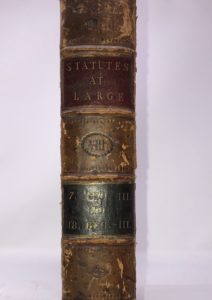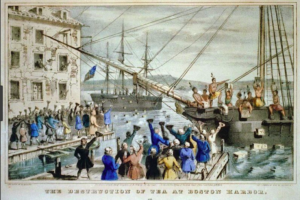Administration of Justice Act (also known as the “Murder Act”)
[14 Geo 3, C. 39], adopted on May 20, 1774
“An act for the impartial administration of justice in the cases of persons questioned for any acts done by them in the execution of the law, or for the suppression of riots and tumults, in the province of the Massachuset’s Bay, in New England”
Parliament responded to colonial defiance and the Boston Tea Party by attempting to reassert its authority with the purposely punitive Coercive Acts. Rather than being intimidated, the colonists were outraged, referring to the five Coercive Act as the “Intolerable Acts.”
The Administration of Justice Act asserted that Boston was attempting to “throw off” the authority of Parliament “by open force.” The Act reasoned that “the present disordered state” of Massachusetts Bay was the result of allowing Boston to go “uncontrouled and unpunished, in defiance of his Majesty’s authority, and to the subversion of all lawful government.”
 Under the Act, the newly appointed military governor of Massachusetts (General Thomas Gage) was granted the discretion to transport accused rebels out of Massachusetts for trial before a British judge “in some other of his Majesty’s colonies, or in Great Britain.” At the same time that the rights of locals were eroded, the Act protected British officials and soldiers from hostile juries. In the event that it was necessary to use force to quell violent protests or collect taxes, the military governor could send the defendants to Britain to stand trial. As a practical matter, removal of a trial to Britain effectively provided immunity for British soldiers, even though the Act provided that witnesses could be compelled to travel for trial (and would have their expenses reimbursed). Taken together, the Act’s provisions led to fear that colonial protests would be violently put down by force.
Under the Act, the newly appointed military governor of Massachusetts (General Thomas Gage) was granted the discretion to transport accused rebels out of Massachusetts for trial before a British judge “in some other of his Majesty’s colonies, or in Great Britain.” At the same time that the rights of locals were eroded, the Act protected British officials and soldiers from hostile juries. In the event that it was necessary to use force to quell violent protests or collect taxes, the military governor could send the defendants to Britain to stand trial. As a practical matter, removal of a trial to Britain effectively provided immunity for British soldiers, even though the Act provided that witnesses could be compelled to travel for trial (and would have their expenses reimbursed). Taken together, the Act’s provisions led to fear that colonial protests would be violently put down by force.
While Gage had a reputation for honesty and was married to an American, he had a growing dislike of Boston and its outspoken residents, who he called the “greatest of bullies.” According to Gage, “lenient measures and the cautious and legal exertions of ….government, served only to render them more daring and licentious.”
The harsh Administration of Justice Act was particularly dismissive of colonial legal rights and prerogatives. Believing that relocating trials would guarantee acquittal for soldiers, colonists referred to the Act as the “Murder Act” since British soldiers would be allowed to get away with murder.
 Background: Parliament responded to colonial defiance and the Boston Tea Party by attempting to reassert its authority with the purposely punitive Coercive Acts. Rather than being intimidated, the colonists were outraged, referring to the five Coercive Act as the “Intolerable Acts.”
Background: Parliament responded to colonial defiance and the Boston Tea Party by attempting to reassert its authority with the purposely punitive Coercive Acts. Rather than being intimidated, the colonists were outraged, referring to the five Coercive Act as the “Intolerable Acts.”
The retaliatory Act was adopted simultaneously with the Massachusetts Government Act on May 20, 1774. Both acts were designed to restore law and order by cracking down on Massachusetts and sending a message to the other colonies that they too would be suppressed if necessary.
As was the case with the other Intolerable Acts, the Administration of Justice Act was a failure. Rather than suppressing colonial resistance, the Coercive Acts unified the colonies and provoked additional opposition. The Acts provided the impetus for the calling of the First Continental Congress in September of 1774.
The Act’s lengthy, introductory whereas clause makes clear why it was adopted and the message Parliament was trying to send:
WHEREAS in his Majesty’s province of Massachuset’s Bay, in New England, an attempt hath lately been made to throw off  the authority of the parliament of Great Britain over the said province, and an actual and avowed resistance, by open force, to the execution of certain acts of parliament, hath been suffered to take place, uncontrouled and unpunished, in defiance of his Majesty’s authority, and to the subversion of all lawful government whereas, in the present disordered state of the said province, it is of the utmost. importance to the general welfare thereof, and to the re-establishment of lawful authority throughout the same, that neither the magistrates acting in support of the laws, nor any of his Majesty’s subjects aiding and assisting them therein, or in the suppression of riots and tumults, raised in opposition to the execution of the laws and statutes of this realm, should be discouraged from the proper discharge of their duty, by an apprehension, that in case of their being questioned for any acts done therein, they may be liable to be brought to trial for the same before persons who do not acknowledge the validity of the laws, in the execution thereof, or the authority of the magistrate in the support of whom, such acts had been done: in order therefore to remove every such discouragement from the minds of his Majesty’s subjects, and to induce them, upon all proper occasions, to exert themselves in support of the public peace of the provinces, and of the authority of the King and parliament of Great Britain over the same; be it enacted by the King’s most excellent majesty, by and with the advice and consent of the lords spiritual and temporal, and commons, in this present parliament assembled, and by the authority of the same, That if any inquisition or indictment shall be found, or if any appeal shall be sued or preferred against any person, for murder, or other capital offence, in the province Of the Massachuset’s Bay, and it shall
the authority of the parliament of Great Britain over the said province, and an actual and avowed resistance, by open force, to the execution of certain acts of parliament, hath been suffered to take place, uncontrouled and unpunished, in defiance of his Majesty’s authority, and to the subversion of all lawful government whereas, in the present disordered state of the said province, it is of the utmost. importance to the general welfare thereof, and to the re-establishment of lawful authority throughout the same, that neither the magistrates acting in support of the laws, nor any of his Majesty’s subjects aiding and assisting them therein, or in the suppression of riots and tumults, raised in opposition to the execution of the laws and statutes of this realm, should be discouraged from the proper discharge of their duty, by an apprehension, that in case of their being questioned for any acts done therein, they may be liable to be brought to trial for the same before persons who do not acknowledge the validity of the laws, in the execution thereof, or the authority of the magistrate in the support of whom, such acts had been done: in order therefore to remove every such discouragement from the minds of his Majesty’s subjects, and to induce them, upon all proper occasions, to exert themselves in support of the public peace of the provinces, and of the authority of the King and parliament of Great Britain over the same; be it enacted by the King’s most excellent majesty, by and with the advice and consent of the lords spiritual and temporal, and commons, in this present parliament assembled, and by the authority of the same, That if any inquisition or indictment shall be found, or if any appeal shall be sued or preferred against any person, for murder, or other capital offence, in the province Of the Massachuset’s Bay, and it shall  appear, by information given upon oath to the governor, or, in his absence, to the lieutenant-governor of the said province, that the fact was committed by the person against whom such inquisition or indictment shall be found, or against whom such appeal shall be sued or preferred, as aforesaid, either in the execution of his duty as a magistrate, for the suppression of riots, or in the support of the laws of revenue, or in acting in his duty as an officer of revenue, or in acting under the direction and order of any magistrate, for the suppression of riots, or for the carrying into effect the laws of revenue, or in aiding and assisting in any of the cases aforesaid: and if it shall also appear, to the satisfaction of the said governor, or lieutenant-governor respectively, that an indifferent trial cannot be had within the said province, in that case, it shall and may be lawful for the governor, or lieutenant-governor, to direct, with the advice and consent of the council, that the inquisition, indictment, or appeal, shall be tried in some other of his Majesty’s colonies, or in Great Britain; and for that purpose, to order. the person against whom such inquisition or indictment shall be found, or against whom such appeal shall be sued or preferred, as aforesaid, to be sent, under sufficient custody, to the place appointed for his trial, or to admit such person to bail, taking a recognizance, (which the said governor, or, in his absence, the lieutenant-governor, is hereby authorised to take), from such person, with sufficient sureries, to be approved of by the said governor, or, in his absence, the lieutenant-governor, in such sums of money as the said governor or, in his absence, the lieutenant-governor, shall deem reasonable for the personal appearance of such person, if the trial shall be appointed to be had in any other colony, before the governor, or lieutenant-governor, or commander in chief of such colony; and if the trial shall be appointed to be had in Great Britain, then before his Majesty’s court of King’s Bench, at a time to be mentioned in such recognizances; and the governor, or lieutenant-governor, or commander in chief of the colony where such trial shall be appointed to be had, or court of King’s Bench, where the trial is appointed to be had in Great Britain, upon the appearance of such person, according to such recognizance, or in custody, shall either commit such person, or admit him to bail, until such trial; and which the said governor, or lieutenant-governor, or commander in chief, and court of King’s Bench, are hereby authorised and impowered to do.
appear, by information given upon oath to the governor, or, in his absence, to the lieutenant-governor of the said province, that the fact was committed by the person against whom such inquisition or indictment shall be found, or against whom such appeal shall be sued or preferred, as aforesaid, either in the execution of his duty as a magistrate, for the suppression of riots, or in the support of the laws of revenue, or in acting in his duty as an officer of revenue, or in acting under the direction and order of any magistrate, for the suppression of riots, or for the carrying into effect the laws of revenue, or in aiding and assisting in any of the cases aforesaid: and if it shall also appear, to the satisfaction of the said governor, or lieutenant-governor respectively, that an indifferent trial cannot be had within the said province, in that case, it shall and may be lawful for the governor, or lieutenant-governor, to direct, with the advice and consent of the council, that the inquisition, indictment, or appeal, shall be tried in some other of his Majesty’s colonies, or in Great Britain; and for that purpose, to order. the person against whom such inquisition or indictment shall be found, or against whom such appeal shall be sued or preferred, as aforesaid, to be sent, under sufficient custody, to the place appointed for his trial, or to admit such person to bail, taking a recognizance, (which the said governor, or, in his absence, the lieutenant-governor, is hereby authorised to take), from such person, with sufficient sureries, to be approved of by the said governor, or, in his absence, the lieutenant-governor, in such sums of money as the said governor or, in his absence, the lieutenant-governor, shall deem reasonable for the personal appearance of such person, if the trial shall be appointed to be had in any other colony, before the governor, or lieutenant-governor, or commander in chief of such colony; and if the trial shall be appointed to be had in Great Britain, then before his Majesty’s court of King’s Bench, at a time to be mentioned in such recognizances; and the governor, or lieutenant-governor, or commander in chief of the colony where such trial shall be appointed to be had, or court of King’s Bench, where the trial is appointed to be had in Great Britain, upon the appearance of such person, according to such recognizance, or in custody, shall either commit such person, or admit him to bail, until such trial; and which the said governor, or lieutenant-governor, or commander in chief, and court of King’s Bench, are hereby authorised and impowered to do.
Click here for a link to the text of the Administration of Justice Act: